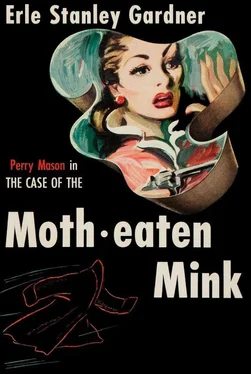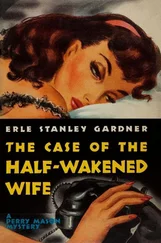“Because I looked at the notebook just before I came to Court to make sure.”
“Oh, then you weren’t sure?”
“Well, I was just guarding against the possibility of any mistake.”
“And you arrested Morris Alburg on the morning of the third?”
“At about nine o’clock. Yes, sir.”
“And took the gun from him at that time?”
“Yes, sir.”
“When did you write the number in your notebook?”
“I’ve already told you. That’s the number of the gun. I wrote it down so there’d be no mistake.”
“When you arrested Morris Alburg?”
“Approximately, yes.”
“What do you mean by approximately?”
“At almost the same time.”
“Within five seconds of the time you made the arrest?”
“Certainly not.”
“How many seconds?”
“I can’t answer that. I don’t compute time that way. That’s the number of the gun I took from the defendant, Morris Alburg.”
“What did you do with that gun?”
“I put it in my pocket as evidence.”
“Then what?”
“I gave it to the district attorney, who in turn gave it to the ballistics expert, Carlyle E. Mott.”
“And it was at Mott’s suggestion that you wrote the numbers in the notebook?” Mason asked, his manner casually matter-of-fact.
“That’s right.”
“At the time the gun was given to him?”
“No, when he returned it to the district attorney with his report. He said that it would be necessary to identify this gun at all stages of the proceedings.”
“So then you wrote down the numbers on a gun which Mott handed you?”
“Well, it was the same gun.”
“How do you know?”
“I could tell by looking at it.”
“What distinctive markings were on this particular gun which enabled you to distinguish it from any other Smith and Wesson gun of similar caliber and design?”
The witness was silent.
“Don’t you know?”
“If I could look at the gun,” he said, “I think I could tell you.”
“Certainly,” Mason said sarcastically. “You’d pick up the gun and turn it over and over, hoping you could find some scratch or some identifying mark, but tell us now what identifying mark was on the gun.”
The officer looked bewildered for a minute before answering, “I can’t recall.”
The judge turned to the discomfited witness. “You took a revolver from the defendant Alburg, is that right?”
“Yes, sir.”
“And you turned that over to the district attorney?”
“Yes, sir.”
“Who, in turn, turned it over to the ballistics expert?”
“Yes, sir.”
“And sometime later, when the ballistics expert returned that weapon to the district attorney, with a report that it was the weapon which had fired the fatal bullet, it was suggested by the ballistics expert that it would be necessary to have an absolute identification of this weapon in order to enable it to be introduced in evidence?”
“Yes, sir.”
“And you were then asked how you could identify this gun. Is that right?”
“Well, generally.”
“Is that right, or isn’t it?”
“Mr. Mott suggested that I should write the number in my notebook.”
“So you took out your notebook and wrote it down at that time?”
“Yes, sir.”
“And was there then some discussion about what your testimony would be?”
“Well, not at the time. That was later.”
“Call your next witness,” Judge Lennox said to Hamilton Burger, and his manner was distinctly frigid. “This witness is excused.”
Burger braced himself for a new attack and said, “My next witness will be Arthur Leroy Fulda.”
Fulda took the stand, was sworn and testified to his conversation with Morris Alburg, to his installation of the sound equipment in the Keymont Hotel, to the conversations that he heard and the recordings that were made.
The witness identified half a dozen plastic discs, explained how they were fed into a machine in relays so that there was a continuous transcription of conversation.
“Now then, Your Honor, I move to introduce these discs in evidence,” Hamilton Burger said.
“I’d like to examine the witness briefly on this particular point,” Mason said.
“Very well,” Judge Lennox said. “Go right ahead.”
“How do you know these are the same records that were left in the hotel room?”
“Actually, Mr. Mason, I can only testify as to the first one. As to the others, all I can say is that they look like records which I left on the machine. I have been informed that they were taken from the hotel room in which I had left my equipment.”
“That’s all,” Mason said. “No objection to the introduction of the records.”
“I assume you mean Record Number One?” Judge Lennox said.
“No, the whole batch,” Mason said. “A witness who is as truthful as this witness is quite likely to have an opinion I can trust. If he thinks these are the same records I’m willing to let them go in, subject to my right to object to any conversation that may be on those records as incompetent, irrelevant and immaterial, but the records themselves may be received in evidence.”
Judge Lennox smiled and said, “Well, that’s refreshing candor on the part of Counsel — and on the part of the witness. Very well, the records will be received as evidence.”
“Now, then, in regard to these records,” Hamilton Burger said, “there is a conversation in which the defendant, Dixie Dayton, states in so many words to Perry Mason that her co-defendant, Morris Alburg, is out murdering George Fayette. I want the Court to listen to that conversation. I want the Court to note that Mr. Mason accepted this information and did absolutely nothing about it. He did not communicate with the police. He did not...”
“Are you now trying to show that 7 am a conspirator?” Mason asked.
“You’ve criticized my methods of preparing a case,” Burger said. “I want the Court to realize exactly what happened.”
Mason said, “Then you’d better show it by evidence, not by a statement.”
“You don’t deny that this conversation is on this record, do you?”
“I deny that Dixie Dayton at any time told me her co-defendant, Morris Alburg, was planning to murder George Fayette.”
“But the record is right here. You can hear her voice.”
“How do you know it’s her voice?” Mason asked.
“I’m sure it is.”
“Then get on the stand and testify it is, and I’ll cross-examine you, and the judge can reach an opinion as to your assumption that it’s the same person.”
“I don’t have to do that,” Burger said. “I can do it another way.”
“Go ahead and do it, then.”
Burger said, “Miss Minerva Hamlin will be my next witness... Miss Hamlin, come forward and be sworn, please.”
Minerva Hamlin marched to the witness stand, her manner that of a young woman who is intent upon creating an impression of brisk competence.
Under Burger’s questioning, she testified with close-clipped, precise, well-articulated words, telling her story in a manner which unquestionably impressed Judge Lennox.
She described the emergency, the fact that she was called on to leave the switchboard and go at once to the Keymont Hotel, the arrangements that she made with Paul Drake by which she would flash an identification signal when the young woman in question started to leave the hotel, her acting the part of a maid in the hotel, and the time she spent watching room 721 in order to see who emerged from it.
“And finally,” Hamilton Burger asked, “someone did emerge from it?”
“Yes, sir.”
“A man or woman?”
“A woman.”
“Did you have an opportunity to look at this woman?”
Читать дальше












